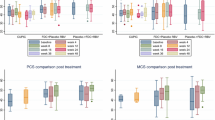Abstract
Objective: This study was conducted to determine the effect of the use of HIV protease inhibitors on the quality of life among persons infected with HIV. Methods: Subjects were participants in the British Columbia Centre for Excellence in HIV/AIDS Drug Treatment Program who had completed two annual participant surveys, one prior to initiating therapy with a protease inhibitor and one after. Quality of life was measured using the Medical Outcomes Study Short Form Health Survey (MOS-SF). Statistical analyses were conducted using parametric and multivariate methods. Results: Our analysis was based on 179 HIV-positive individuals. Compared to quality of life at baseline, we found no statistically significant changes in the health perception, pain, physical, role and social functioning MOS-SF subscale scores at follow-up. The measure of mental health was the only component to decline significantly over time. Sub-analyses found significant increases in the measures of health perception (p = 0.004), physical (p = 0.037), role (p < 0.001) and social functioning (p = 0.053) for individuals with a low baseline quality of life. For those with a higher quality of life before starting a protease inhibitor containing regimen we observed a significant decline in the subscales of mental health (p = 0.001), physical (p = 0.007), role (p = 0.021) and social functioning (p = 0.003) over the study period. Conclusions: Our findings indicate that despite strict dosage requirements and adverse side effects associated with protease inhibitor use patients are on the whole maintaining their quality of life after starting on a protease inhibitor containing regimen. Continued follow-up of this cohort will be required to determine the long term implications of these observations.
Similar content being viewed by others
References
Forrest DM, Seminari E, Hogg RS, et al. The incidence and spectrum of AIDS-defining illnesses in persons treated with antiretroviral drugs. Clin Infect Diseases 1998; 27(6): 1379–1385.
Montaner JS, Hogg RS, O'Shaughnessy MV. Emerging international consensus for use of antiretroviral therapy. Lancet 1997; 349(9058): 1042.
Hogg RS, Heath KV, Yip B, et al. Improved survival among HIV-infected individuals following initiation of antiretroviral therapy. JAMA 1998; 279(6): 450–454.
Walsh JC, Jones CD, Barnes EA, Gazzard BG, Mitchell SM. Increasing survival in AIDS patients with cytomega-lovirus retinitis treated with combination antiretroviral therapy including HIV protease inhibitors. AIDS 1998 Apr 16; 12(6): 613–618.
Pezzotti P, Napoli PA, Acciai S, et al. Increasing survival time after AIDS in Italy: The role of new combination antiretroviral therapies. Tuscany AIDS Study Group. AIDS 1999 Feb 4; 13(2): 249–255.
Tsiodras S, Mantzoros C, Hammer S, Samore M. Effects of protease inhibitors on hyperglycemia, hyperlipidemia, and lipodystrophy: A 5-year cohort study. Arch Internal Med 2000 Jul 10; 160(13): 2050–2056.
de Boer JB, van Dam FS, Sprangers MA. Health-related quality-of-life evaluation in HIV-infected patients. A review of the literature. Pharmacoeconomics 1995; 8(4): 291–304.
Franchi D, Wenzel RP. Measuring health-related quality of life among patients infected with human immunodeficiency virus. Clin Infect Diseases 1998; 26(1): 20–26.
Griffin KW, Rabkin JG, Remien RH, Williams JB. Disease severity, physical limitations and depression in HIV-infected men. J Psychosomatic Res 1998; 44(2): 219–227.
Ragsdale D, Morrow JR. Quality of life as a function of HIV classification. Nursing Res 1990; 39: 355-359.
Wu AW, Rubin HR, Mathews WC, et al. Functional status and well-being in a placebo-controlled trial of zidovudine in early symptomatic HIV infection. J Acquir Immune Defic Syndr 1993; 6(5): 452–458.
Revicki DA, Swartz C, Wu AW, Haubrich R, Collier AC. Quality of life outcomes of saquinavir, zalcitabine and combination saquinavir plus zalcitabine therapy for adults with advanced HIV infection with CD4 counts between 50 and 300 cells/mm3. Antiviral Therapy 1999; 4(1): 35–44.
BC Centre for Excellence in HIV/AIDS. Therapeutic guidelines for the treatment of HIV/AIDS and related conditions, 1999.
Hogg RS, Yip B, Chan K, et al. Diminished Effectiveness of Antiretroviral Therapy among Patients Initiating Therapy with CD4+ cell counts below 200/mm3. XIII International AIDS Conference, Durban. July 2000 (abstract LB7050).
Carpenter CCJ, Fischl MA, Hammer SM, et al. Antiretroviral therapy for HIV in 1997: Updated recommendations of an international panel. JAMA 1997; 277: 1962–1969.
Lenderking WR, Gelber RD, Cotton DJ, et al. Evaluation of the quality of life associated with zidovudine treatment in asymptomatic human immunodeficiency virus infection. The AIDS Clinical Trials Group. N E J Med 1994; 330(11): 738– 743.
Reiter GS. Human immunodeficiency virus (HIV) in America, 1981 to 1997: Epidemiologic and therapeutic considerations. Seminars in Ultrasound, CT and MRI 1998; 19(2): 122–127.
Carr A, Samaras K, Burton S, et al. A syndrome of peripheral lipodystrophy, hyperlipidaemia and insulin resistance in patients receiving HIV protease inhibitors. AIDS 1998; 12: F51–F58.
Gazzard BG, Moyle GJ, Weber J, et al. British HIV As-sociation guidelines for antiretroviral treatment of HIV seropositive individuals. Lancet 1997; 349: 1086–1092.
Revicki DA, Sorensen S, Wu AW. Reliability and validity of physical and mental health summary scores from the Medical Outcomes Study HIV Health Survey. Med Care 1998; 36(2): 126–137.
O'Leary JF, Ganz PA, Wu AW, Coscarelli A, Petersen L. Toward a better understanding of health-related quality of life: A comparison of the Medical Outcomes Study HIV Health Survey (MOS-HIV) and the HIV Overview of Problems-Evaluation System (HOPES). J Acquir Immune Defic Syndr & Human Retrovirology 1998; 17(5): 433–441.
Revicki DA, Moyle G, Stellbrink HJ, Barker C. Quality of life outcomes of combination zalcitabine-zidovudine, saquinavir-zidovudine, and saquinavir-zalcitabine-zidovu-948 dine therapy for HIV-infected adults with CD4 cell counts between 50 and 350 per cubic millimeter. AIDS 1999; 13: 851–858.
Lenderking WR, Testa MA, Katzenstein D, Hammer S. Measuring quality of life in early HIV disease: The modular approach. Qual Life Res 1997; 6(6): 515–530.
Author information
Authors and Affiliations
Rights and permissions
About this article
Cite this article
Low-Beer, S., Chan, K., Wood, E. et al. Health related quality of life among persons with HIV after the use of protease inhibitors. Qual Life Res 9, 941–949 (2000). https://doi.org/10.1023/A:1008985728271
Issue Date:
DOI: https://doi.org/10.1023/A:1008985728271




